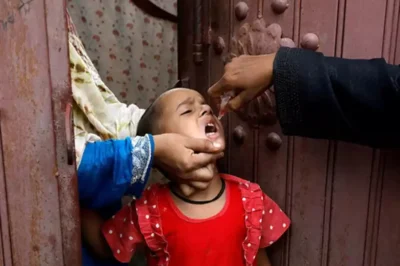Pakistan is experiencing a significant health emergency as poliovirus has been identified in sewage samples from 20 districts. The National Reference Laboratory confirmed that, between May and June, 17 out of 28 samples tested positive for Wild Poliovirus Type 1 (WPV1). The virus was detected in major cities such as Lahore, Karachi, and Islamabad.
Sindh province recorded the highest count of contaminated sewage samples, with 14 positive cases spanning 10 districts. Lahore identified three cases, while Islamabad and four districts in Khyber Pakhtunkhwa also reported positive samples. In Balochistan, the virus was detected in Mastung, Khuzdar, and Sibi. Additionally, Mirpur in Pakistan-administered Jammu and Kashmir tested positive for the virus.
The increase in polio cases coincides with Pakistan facing a vaccination refusal crisis. During the recent nationwide immunization campaign, over 60,000 individuals declined vaccination, with Karachi responsible for 39,000 refusals. A senior health official stated to ARY News that the challenge extends beyond the virus itself, as they are also combating misinformation and distrust.
Health specialists caution that polio transmits via contaminated water or food and can lead to paralysis or death. Since there is no cure for the disease, vaccination remains the sole preventive measure. The World Health Organization emphasizes that children under five, who are most at risk, need multiple doses of the oral vaccine for effective protection.
Although nationwide efforts are underway, significant regions in southern Khyber Pakhtunkhwa are still difficult for vaccination teams to reach, leaving many children vulnerable. Pakistan is one of only two countries where polio is still endemic, with Afghanistan being the other. The recent detection of a new case this week raises the total number of polio cases in Pakistan for 2025 to 13.
Sources News From Various Digital Platforms, Websites, Journalists, And Agencies.








Leave a Reply